Wired looks, quick answers, and humour
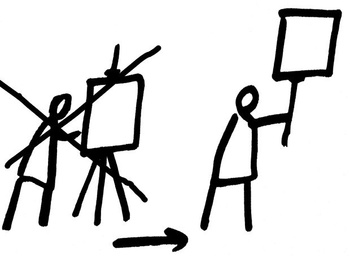
A prestigious museum, a rebellious act. That was our first introduction to the fascinating work of Dan Perjovschi. Graffiti with depth, art in public proportions. A huge wall in the lobby of the New York MoMA, filled with minimal drawings with a message. About art, the artist, consumers, and humans. Funny, hilarious, and sharp...painfully sharp. Art that makes people think through clarity. With a rebellious act that leaves no doubt about the meaning of the rebellion, but subtle enough to grasp and hold the eye of the beholder. But there's more to Dan Perjovschi's story than meets the eye. Together with his wife Lia, he has developed an impressive artistic practice that is grounded in freedom, openness, reflection, critical positioning, and social texture. An effort to link a shady past to the present and the future, that will now be rewarded with the ECF Princess Margriet Award in Brussels.
What was it that sparked off your artistic collaboration? “Life,” is Dan Perjovschi’s short answer to this question. And artist couple Dan and Lia Perjovschi’s practice still appeals to life itself. Their critical art is rooted in Romania during Ceausescu and the Securitate and consists of installations of drawings, photos, and objects, among other things. With minimal means and maximal impact, they treat artistic, social, financial, economic, and political dimensions, and they consciously continue to do so from their homeland. The association between their individual artistic developments builds bridges between the past, present, and future, and blends the intimate and the public, the local and the global. Their collaboration and generosity in developing the Center for Art Analysis and opening their studio as a space of encounter and public discussion are now being recognised with the ECF Princess Margriet Award. In addition to a debate session at The Egg, followed by the presentation of the prize, the display of Sorry We’re Closed is presenting a flat retrospective of Dan Perjovschi’s fascinatingly clever murals.
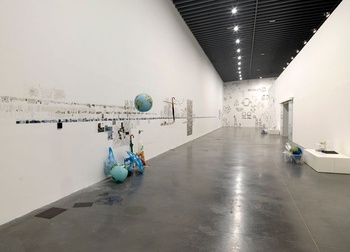
How should we interpret your collaboration? How does one nurture the other?
Lia Perjovschi: We are an artist couple, with two independent careers, two different experiences. We are and have been looking for survival strategies to do our profession in a very difficult context, lost in time. We both wanted to make a difference in our space. Since 1989, we have been fighting for a democratic society, and opened up our studio. The Center for Art Analysis (CAA) is my project, born from my need, developed from my practice. It is an on-going collection and archive of books, files, audio, video, and digital material on contemporary art, theory, and culture based on over 20 years of research. The CAA has evolved into a platform in which we share our expertise, debate, empower. It has become useful for others, also with Dan’s financial help and intellectual involvement. I’m trying to recuperate 50 years (1950s to 1990s). Dan is interested in quotidian issues, I pay attention to current needs, but building more for the future.
Dan Perjovschi: Lia’s platforms allow me to occupy a public position beyond my job with a political magazine and my media friendly persona – wired looks, quick answers, juicy expressions, and humour. Archiving and collecting is Lia’s business, mine is to secure allies and communicate.
To build such a Center for Art Analysis, you have to stay very informed. The world of information has undergone an immense shift from a selection of sources that cost money to a plethora of sources that can be reached for free, in a democratic way. How do you experience this digital era in relation to your practice?
Lia: I am very happy with the Internet, Wikipedia, being able to travel and buy books – those are the only things I really need. It took me years to orientate myself, but it gets easier every year. We were lucky: it is good to be mature when change happens. You’re able to select, understand, protect, and manage. The amount of information is overwhelming for young people, and it can be confusing. You often hear them complain that nobody is making any selections anymore. I like to do so myself, and I appreciate when others do too. Apart from that, I have about forty events a year – exhibitions, lectures, newspaper inserts, workshops – and I travel to more than 20 cities every year. All these encounters keep me updated.
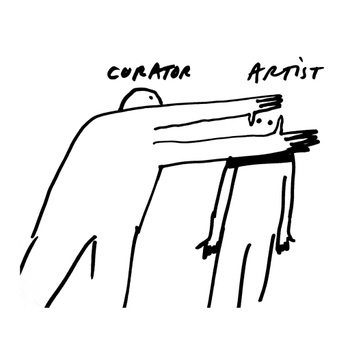
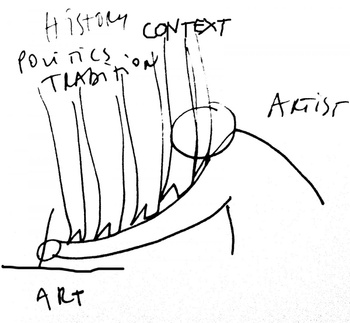
Did we lose something on the way to that democratic information society? Is knowledge harder to attain these days – when a large part of information seems to have shifted towards opinion?
Lia: Today you need to focus more to be able to get through that big, general, and superficial blah-blah, but there are a lot of interesting discoveries to be made. Things are relative, temporary, and complex. But I think that’s a good thing, it has a lot of potential. The only thing I regret, is that we can’t rely on certain, practical, and useful things in our daily lives, because people have sold out their positions. We need to know banking, medicine, our rights, nutrition, everything needed in order to survive... I don’t want to go with the flow, if I don’t feel comfortable with it…and I don’t go.
Dan: It is hard to select or not to let yourself be fooled by something that looks like something – like Documenta looking like Documenta, but not really being one. But why complain? I grew up in an intellectual environment with no information whatsoever, few books, heavy censorship, no market, and no possible underground. People should make maximum use of their access to all of these possibilities today. It is a luxury.
You have both developed your artistic practices on the critical grounds of the margin surrounding institutionalised art, and opted for a very generous artistic practice inviting fellow artists, the audience, etc. to take part in your work. That way, public space becomes part of the artistic process. Did that come naturally?
Lia: I don’t know if it was generosity or necessity. Everything I do is motivated by my personal, local, and global position, like a GPS. But we did the best we could with what we had. It came naturally, and grew and changed organically.
Dan: I see myself more as a mainstream artist - or rather: a marginal mainstream artist – exhibiting in almost all major biennials and museums on the planet. The fact that the main trunk of my art is not collectable gave me the edge. I did not start radically and end up making videos for Russian billionaires. I started mildly and became more radical while exhibiting in the mainstream.
But Lia and I always found time and opened up to young people, other artistic positions, and the public at large. I may be popular with the doorman of the museum, but not necessarily with its director. My drawings made their way into the activist world and helped, assisted, and accompanied many social movements in Romania or elsewhere.
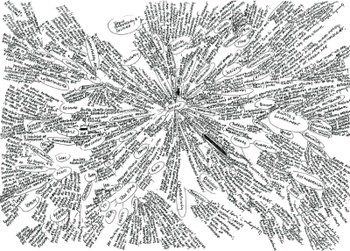
Often, this period is described as an age in which rebellion is lost. On the other hand, the Indignados and Occupy movements have sparked global commitment. What are your thoughts on that?
Lia: In some parts of the world rebellion is lost, but in others it is just starting. I like the fact that global commitment is growing. More people are understanding that we have to find new solutions, that we are in fact responsible ourselves. I believe in an intelligent revolution: a revolution through progress, made possible by new technologies, but depending on us to understand and use all its possibilities. The other option is to give up on the Internet like we did with television, and allow it to turn into nothing but cheap entertainment, used to brainwash us. Everything that happens has a meaning, is telling us something. Just like the Indignados and the Occupy movements. But it is not enough. What will be the third movement? And the next?
Dan: I sympathise with all those movements and in some cases I got involved myself. Protesters identify with my drawings and ask them for T-shirts or posters. I always say yes. If I were to run a city or a country, I would be very attentive to these people who are no longer socially zoned out. Those are conscious people who tell us something. We should listen!
The art scene was quick to open up, use, and misuse the movements: the Documenta curator “officially” welcomed the Occupy protesters in front of Fridericianum. That is why I like arts. Politics, science, or any other field aren’t as open.

Is the conflict between the local (you have always stayed in Romania) and the global (the appeal of your work, the range of your subject matter) one that you struggle with? Or does the local environment simply function as the starting point for a global practice?
Lia: Locally I am more critical, because I have better knowledge of the problems. But in general, everything I do is motivated by my personal, local, and global position (like a GPS).
Dan: We were international staying at home. My artistic language and my understanding of art are not local. I come from a different tradition: the no model. To survive in an unfriendly environment – official institutions at home never liked us, we are perceived as a threat – we started the Dizzydent programme (from the English word “dizzy”). You have to be known abroad not to be killed inside. And our resistance is a dizzying one, because yesterday’s allies can be today’s enemies. The fact that we never moved to Berlin or Paris was a political decision. We are here to fight – intellectually of course.
Do you think art should be grounded in society? Is committed art a duty?
Dan: Yes!
Lia: I think that an artist, just like any other person, can’t avoid getting involved. Artists don’t live on another planet. Art was, is, and will be many things, constantly changing in an ever-changing world. I am more interested in art grounded in society, but I don’t see it as an obligation. That would be artificial. Honesty is very important, everywhere, anytime in anything: in our general history there have been too many misunderstandings, mistakes, and lies which made us lose time, ideas, and possibilities.
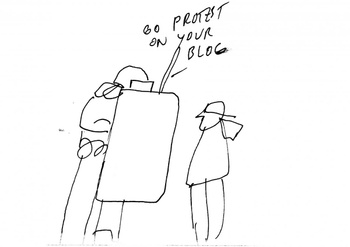
You vent your “frustrations”, thoughts, and reflections through straightforward humour and apparently very simple drawings. Are those limited means a way of getting as many people as possible involved?
Dan: Minimal expression for maximal impact. People identify with my drawings. In a wall of 100 drawings, you can recognize “your own drawing”. There is no gap between me, the artist, and you, the viewer. No fear. Everyone can do it. We are in this together.
Are we laughing not to cry?
Dan: I do not intend to piss you off, I want to make you think. I am emphatic, not cynical. I want your understanding, not your nerves.
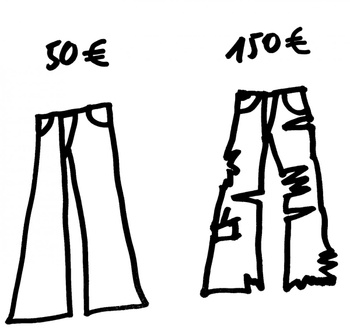
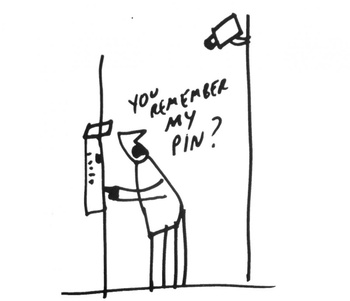
Your critique has a wide range, from the situation of the artist, to social, financial, economic, and political themes. How do you cope? Has the institutionalised art world lost sight of the human side? And has the audience too?
Dan: Yes, I think the institutionalised art world has lost sight of something. Everything is too controlled nowadays. The big institutions have become self absorbed, too obsessed with funding and power. They are stuck in their own thinking, and seem to forget what they are there for. Museums are collapsing in the market, art fairs look like biennials, and the other way around. Art news has become financial news. I think we all lost humour. And if we find it, we place it on umbrellas, lighters, and little black books in museum shops.
ECF Princess Margriet Award 2013 Debate 19/3, 14.30, The Egg, rue Barastraat 175, Anderlecht, www.deburen.eu & Dan Perjovschi: Flat Retrospective 18/3 > 18/5, Sorry We’re Closed, Regentschapsstraat 65A rue de la Régence, Brussel/Bruxelles, www.sorrywereclosed.com
Fijn dat je wil reageren. Wie reageert, gaat akkoord met onze huisregels. Hoe reageren via Disqus? Een woordje uitleg.